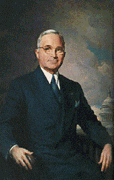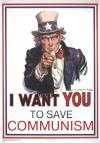
WAR CRIMINAL

"It is my opinion that the use of this barbarous weapon at Hiroshima and Nagasaki was of no material assistance in our war against Japan. The Japanese were almost defeated and ready to surrender...in being the first to use it, we...adopted an ethical standard common to the barbarians of the Dark Ages."Truman, Truman, atom bomb, atomic bomb, Truman, Truman, atom bomb, atomic bomb, Truman, Truman, atom bomb, atomic bomb, Truman, Truman, atom bomb, atomic bomb, Truman, Truman, atom bomb, atomic bomb, Truman, Truman, atom bomb, atomic bomb, Truman, Truman, bomb---Fleet Admiral William D. Leahy,
Chair of the Joint Chiefs of Staff during World War II
"If no international agreement is concluded immediately after the first demonstration, this will mean a flying start of an unlimited armaments race."
The report pointed out that the United States, with its highly concentrated urban areas, would become a prime target for nuclear weapons and concluded:
"We believe that these considerations make the use of nuclear bombs for an early, unannounced attack against Japan inadvisable. If the United States would be the first to release this new means of indiscriminate destruction upon mankind, she would sacrifice public support throughout the world, precipitate the race of armaments, and prejudice the possibility of reaching an international agreement on the future control of such weapons."
"Based on a detailed investigation of all the facts and supported by the testimony of the surviving Japanese leaders involved, it is the Survey's opinion that certainly prior to 31 December 1945 and in all probability prior to 1 November 1945, Japan would have surrendered even if the atomic bombs had not been dropped, even if Russia had not entered the war, and even if no invasion had been planned or contemplated."
Mr. Truman,
As you have been directly responsible for the loss of our son's life in Korea, you might just as well keep this emblem on display in your trophy room, as a memory of one of your historic deeds. One major regret at this time is that your daughter was not there to receive the same treatment as our son received in Korea.
Mr. & Mrs. William Banning of New Canaan, CT
This is from a letter Truman wrote in response to a review of his daughter's singing by Washington Post music critic Paul Hume in December 1950:
" Some day I hope to meet you. When that happens you'll need a new nose, a lot of beefsteak for black eyes, and perhaps a supporter below!"
Truman mused thus to two American musicians at the Potsdam Conference - "I wonder how much better off the country would have been if I had been a concert pianist."
 FDR Scandal Page and why we entered WWII
FDR Scandal Page and why we entered WWII
See the JFK Sex Scandel Page
An excellent resource on the question of the bomb is Was Hiroshima Necessary?
For many links see Nuclear Files
E-mail Mark Willey: pha1941@hotmail.com.